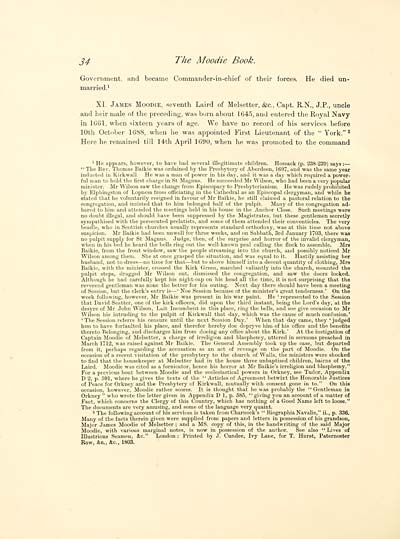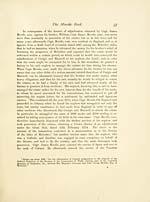Moodie book
(52) Page 34
Thumbnail gallery: Grid view | List view

34 The Moodie Book.
Government, and became Commander-in-chief of their forces. He died un-
married. 1
XI. James Moodie, seventh Laird of Melsetter, &c, Capt. R.N., J.P., uncle
and heir male of the preceding, was born about 1645, and entered the Royal Navy
in 1061, when sixteen years of age. We have no record of his services before
10th October 1688, when he was appointed First Lieutenant of the " York." 2
Here he remained till 14th April 1690, when he was promoted to the command
1 He appears, however, to have had several illegitimate children. Hossack (p. 238-239) says : —
" The Rev. Thomas Baikie was ordained by the Presbytery of Aberdeen, 1697, and was the same year
inducted in Kirkwall. He was a man of power in his day, and it was a day which required a power-
ful man to hold the first charge in St Magnus. He succeeded Mr Wilson, who had been a very popular
minister. Mr Wilson saw the change from Episcopacy to Presbyterianisin. He was rudely prohibited
by Elphingston of Lopness iron) officiating in the Cathedral as an Episcopal clergyman, and while he
stated that he voluntarily resigned in favour of Mr Baikie, he still claimed a pastoral relation to the
congregation, and insisted that to him belonged half of the pulpit. Many of the congregation ad-
hered to him and attended the meetings held in his house in the Anchor Close. Such meetings were
no doubt illegal, and should have been suppressed b}' the Magistrates, but these gentlemen secretly
sympathised with the persecuted prelatists, and some of them attended their conventicles. The very
beadle, who in Scottish churches usually represents standard orthodoxy, was at this time not above
suspicion. Mr Baikie had been unwell for three weeks, and on Sabbath, 3rd Januar}' 1703, there was
no pulpit supply for St Magnus. Judge, then, of the surprise and horror of the invalid clergyman,
when in his bed he heard the bells ring out the well-known peal calling the flock to assemble. Mrs
Baikie, from the front window, saw the people streaming into the church, and possibly noticed Mr
Wilson among them. She at once grasped the situation, and was equal to it. Hastily assisting her
husband, not to dress — no time for that — but to shove himself into a decent quantity of clothing, Mrs
Baikie, with the minister, crossed the Kirk Green, marched valiantly into the church, mounted the
pulpit steps, dragged Mr Wilson out, dismissed the congregation, and saw the doors locked.
Although he had carefully kept his night-cap on his head all the time, it is not surprising that the
reverend gentleman was none the better for his outing. Next day there should have been a meeting
of Session, but the clerk's entry is — ' Noe Session because of the minister's great tenderness.' On the
week following, however, Mr Baikie was present in his war paint. He ' represented to the Session
that David Seatter, one of the kirk officers, did upon the third instant, being the Lord's day, at the
desyre of Mr John Wilson, Lait Incumbent in this place, ring the bells, and soe give occasion to Mr
Wilson his intruding to the pulpit of Kirkwall that day, which was the cause of much confusion.'
' The Session referrs his censure until the next Session Day.' When that day came, they 'judged
him to have forfaulted his place, and therefor hereby doe depr3've him of his office and the benetite
thereto Belonging, and discharges him from doeing any office about the Kirk.' At the instigation of
Captain Moodie of Melsetter, a charge of irreligion and blasphemy, uttered in sermons preached in
March 1712, w as raised against Mr Baikie. The General Assembly took up the case, but departed
from it, perhaps regarding the accusation as an act of revenge on the part of Moodie. On the
occasion of a recent visitation of the presbytery to the church of Walls, the ministers were shocked
to find that the housekeeper at Melsetter had in the house three unbaptised children, bairns of the
Laird. Moodie was cited as a fornicator, hence his horror at Mr Baikie's irreligion and blasphemy."
For a previous bout between Moodie and the ecclesiastical powers in Orkney, see Tudor, Appendix
D 2, p. 591, where he gives the texts of the " Articles of Agreement betwixt the Honorable Justices
of Peace for Orkney and the Presbytery of Kirkwall, mutually with consent gone in to." On this
occasion, however, Moodie rather scores. It is thought that he was probably the "Gentleman in
Orkney " who wrote the letter given in Appendix D 1, p. 585, " giving you an account of a matter of
Fact, which concerns the Clergy of this Country, which has nothing of a Good Name left to loose."
The documents are very amusing, and some of the language very quaint.
2 The following account of his services is taken from Charnock's " BiographiaNavalis," ii., p. 336.
Many of the facts therein given were supplied from papers and letters in possession of his grandson,
Major James Moodie of Melsetter ; and a MS. copy of this, in the handwriting of the said Major
Moodie, with various marginal notes, is now in possession of the author. See also "Lives of
Illustrious Seamen, &c." London : Printed by J. Cundee, Ivy Lane, for T. Hurst, Paternoster
Row, &c., &c, 1803.
Government, and became Commander-in-chief of their forces. He died un-
married. 1
XI. James Moodie, seventh Laird of Melsetter, &c, Capt. R.N., J.P., uncle
and heir male of the preceding, was born about 1645, and entered the Royal Navy
in 1061, when sixteen years of age. We have no record of his services before
10th October 1688, when he was appointed First Lieutenant of the " York." 2
Here he remained till 14th April 1690, when he was promoted to the command
1 He appears, however, to have had several illegitimate children. Hossack (p. 238-239) says : —
" The Rev. Thomas Baikie was ordained by the Presbytery of Aberdeen, 1697, and was the same year
inducted in Kirkwall. He was a man of power in his day, and it was a day which required a power-
ful man to hold the first charge in St Magnus. He succeeded Mr Wilson, who had been a very popular
minister. Mr Wilson saw the change from Episcopacy to Presbyterianisin. He was rudely prohibited
by Elphingston of Lopness iron) officiating in the Cathedral as an Episcopal clergyman, and while he
stated that he voluntarily resigned in favour of Mr Baikie, he still claimed a pastoral relation to the
congregation, and insisted that to him belonged half of the pulpit. Many of the congregation ad-
hered to him and attended the meetings held in his house in the Anchor Close. Such meetings were
no doubt illegal, and should have been suppressed b}' the Magistrates, but these gentlemen secretly
sympathised with the persecuted prelatists, and some of them attended their conventicles. The very
beadle, who in Scottish churches usually represents standard orthodoxy, was at this time not above
suspicion. Mr Baikie had been unwell for three weeks, and on Sabbath, 3rd Januar}' 1703, there was
no pulpit supply for St Magnus. Judge, then, of the surprise and horror of the invalid clergyman,
when in his bed he heard the bells ring out the well-known peal calling the flock to assemble. Mrs
Baikie, from the front window, saw the people streaming into the church, and possibly noticed Mr
Wilson among them. She at once grasped the situation, and was equal to it. Hastily assisting her
husband, not to dress — no time for that — but to shove himself into a decent quantity of clothing, Mrs
Baikie, with the minister, crossed the Kirk Green, marched valiantly into the church, mounted the
pulpit steps, dragged Mr Wilson out, dismissed the congregation, and saw the doors locked.
Although he had carefully kept his night-cap on his head all the time, it is not surprising that the
reverend gentleman was none the better for his outing. Next day there should have been a meeting
of Session, but the clerk's entry is — ' Noe Session because of the minister's great tenderness.' On the
week following, however, Mr Baikie was present in his war paint. He ' represented to the Session
that David Seatter, one of the kirk officers, did upon the third instant, being the Lord's day, at the
desyre of Mr John Wilson, Lait Incumbent in this place, ring the bells, and soe give occasion to Mr
Wilson his intruding to the pulpit of Kirkwall that day, which was the cause of much confusion.'
' The Session referrs his censure until the next Session Day.' When that day came, they 'judged
him to have forfaulted his place, and therefor hereby doe depr3've him of his office and the benetite
thereto Belonging, and discharges him from doeing any office about the Kirk.' At the instigation of
Captain Moodie of Melsetter, a charge of irreligion and blasphemy, uttered in sermons preached in
March 1712, w as raised against Mr Baikie. The General Assembly took up the case, but departed
from it, perhaps regarding the accusation as an act of revenge on the part of Moodie. On the
occasion of a recent visitation of the presbytery to the church of Walls, the ministers were shocked
to find that the housekeeper at Melsetter had in the house three unbaptised children, bairns of the
Laird. Moodie was cited as a fornicator, hence his horror at Mr Baikie's irreligion and blasphemy."
For a previous bout between Moodie and the ecclesiastical powers in Orkney, see Tudor, Appendix
D 2, p. 591, where he gives the texts of the " Articles of Agreement betwixt the Honorable Justices
of Peace for Orkney and the Presbytery of Kirkwall, mutually with consent gone in to." On this
occasion, however, Moodie rather scores. It is thought that he was probably the "Gentleman in
Orkney " who wrote the letter given in Appendix D 1, p. 585, " giving you an account of a matter of
Fact, which concerns the Clergy of this Country, which has nothing of a Good Name left to loose."
The documents are very amusing, and some of the language very quaint.
2 The following account of his services is taken from Charnock's " BiographiaNavalis," ii., p. 336.
Many of the facts therein given were supplied from papers and letters in possession of his grandson,
Major James Moodie of Melsetter ; and a MS. copy of this, in the handwriting of the said Major
Moodie, with various marginal notes, is now in possession of the author. See also "Lives of
Illustrious Seamen, &c." London : Printed by J. Cundee, Ivy Lane, for T. Hurst, Paternoster
Row, &c., &c, 1803.
Set display mode to:
![]() Universal Viewer |
Universal Viewer | ![]() Mirador |
Large image | Transcription
Mirador |
Large image | Transcription
Images and transcriptions on this page, including medium image downloads, may be used under the Creative Commons Attribution 4.0 International Licence unless otherwise stated. ![]()
| Histories of Scottish families > Moodie book > (52) Page 34 |
|---|
| Permanent URL | https://digital.nls.uk/95605109 |
|---|
| Description | A selection of almost 400 printed items relating to the history of Scottish families, mostly dating from the 19th and early 20th centuries. Includes memoirs, genealogies and clan histories, with a few produced by emigrant families. The earliest family history goes back to AD 916. |
|---|

![Illustrated plate[NLSBLANK]Captain James Moodie of Melsetter, R.N.](https://deriv.nls.uk/dcn4/9560/95605123.4.jpg)